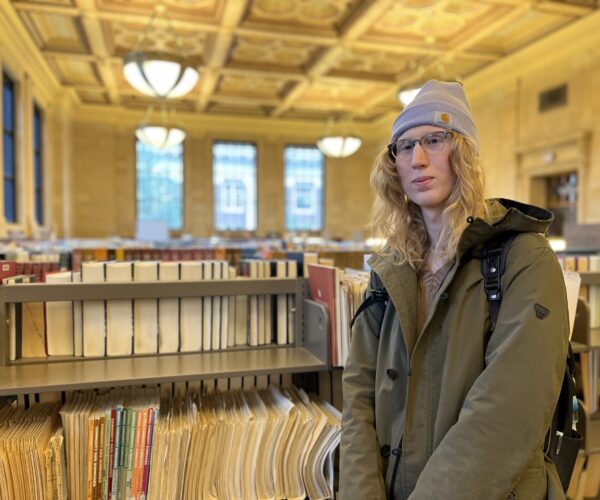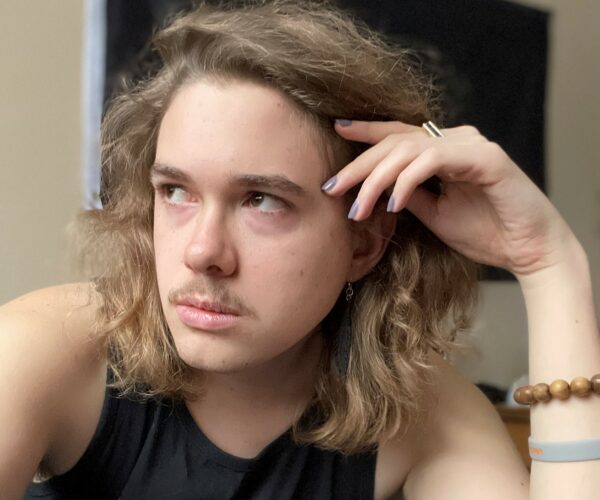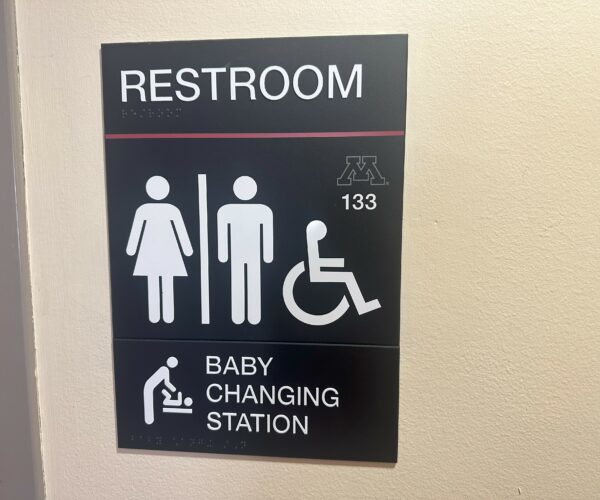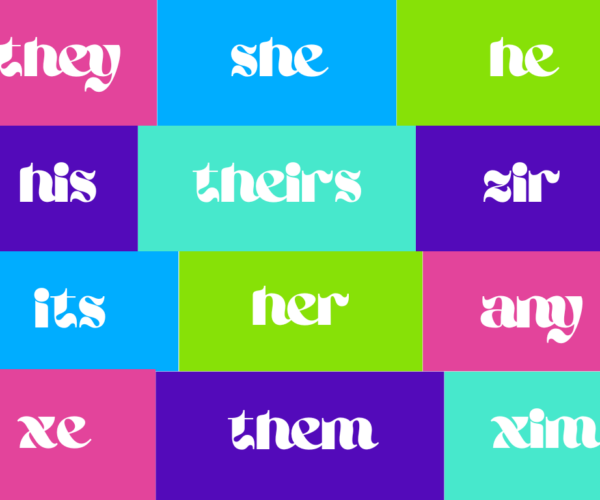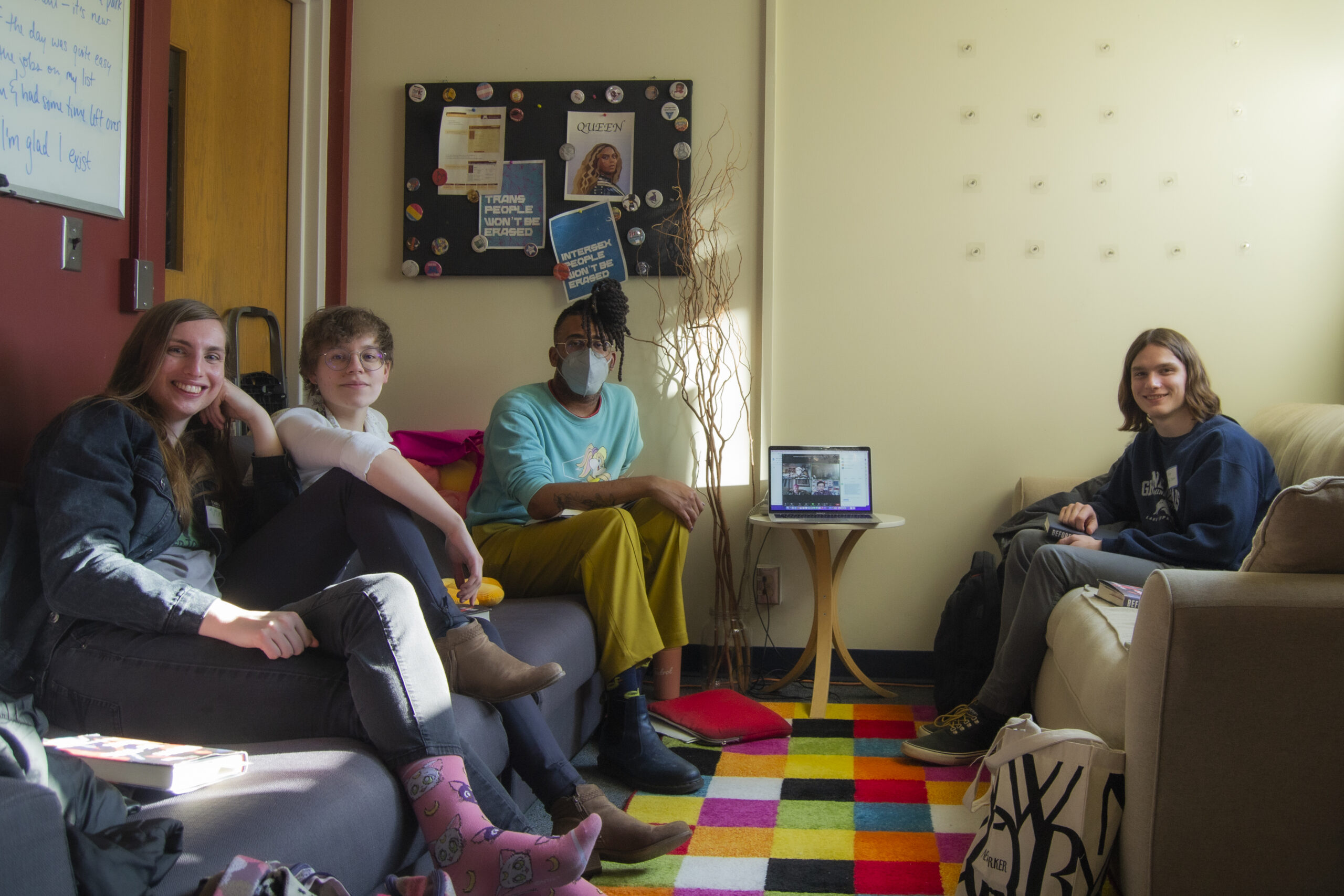By Sommer Wagen
At the Gender and Sexuality Center for Queer and Trans Life (GSC) Queer Book Club, members come together to analyze queer literature, empathize with shared experiences and engage meaningfully with differences.
The GSC’s newest director, Mycall Akeem Riley, started the club. Riley uses all pronouns, but will be referred to with they and them for consistency.
As a Black queer person, Riley said book clubs possess a power to connect people on societal margins. “Around issues of identity, power, privilege and difference, book clubs allow people to tap in without being like ‘here’s my trauma,’” they said. “The book can be somewhat of a crutch to other conversations that maybe people need a bit more pushing and bravery to tap into.”
Support for trans students
The club, which started on Feb. 3, has been discussing the book “Before We Were Trans: A New History of Gender” by nonbinary writer, academic and trans awareness trainer Kit Heyam. Kirkus Reviews described it as “a capable, worthy demonstration of how the history of disrupting the gender binary is as long as human history itself.”
Riley said the decision to discuss “Before We Were Trans” was informed by the larger goal of the GSC to offer support to trans students on campus and in the larger community.
“As the new director of the GSC, a big goal of mine and of the GSC’s work is to nuance and think broadly about how to support trans and gender expansive folks,” they said.
The GSC already provides resources to trans students concerning legal name and gender marker changes and navigating health insurance for medical procedures. As an extension of these services, Riley said the book club is working to clarify gender nonconformity for people outside of the queer community by opening a discussion of the concept and its history.
“The hope is being able to reach lots of different people in lots of different ways,” they said. “We need to look at the history. Resistance is not something new.”
The collectivist spirit
Dante Rocío, a first-year College of Liberal Arts student who identifies as transmasculine, first came to the GSC for financial support. Now, he works as a co-facilitator for the center’s book club. Rocío uses both he and they pronouns, but will be referred to with they and them for consistency.
Rocío said the GSC offered him the role of co-facilitator for the book club in the hope that a peer-facilitated club would be more welcoming to queer students.
“It’s an honor for me to run a queer initiative,” they said. “Plus, it gives me an excuse to come to the GSC lounge.”
The GSC lounge, Queer Book Club’s in-person location, is a small yet cozy space tucked away in the basement of Appleby Hall in room 40. Large windows spill sunlight into the room, whose walls are decorated with various pride flags, colorful art and messages encouraging self-care and rest.
The book club’s Friday afternoon meetings take place in a hybrid format. About half of the group sits in a semicircle on couches and cushions in the GSC lounge, while the other half attends via Zoom.
The club’s members also generated their own community guidelines, which they can update on a living document. This collectivist mindset helps “make sure everyone feels an equal level of importance, validity and space to share,” Rocío said.
Vix, a transfeminine book club member who was only comfortable giving their first name, said this “gives people ownership over the spaces that they’re in.”
Integrating into the queer community
Vix said the discussion of trans history in “Before We Were Trans” was what initially drew her to the club as well as her desire to become more involved in the queer community on campus after living in Minnetonka for most of her student career.
“Doing this has actually kind of integrated me more into the University of Minnesota’s queer community,” she said. “I didn’t even know [the GSC] existed. It’s really helped seeing what’s going on around here and seeing what other queer people in the University are doing.”
Vix added that reading and discussing “Before We Were Trans” has helped her reflect upon her own identity — something she normally isn’t always comfortable doing.
“This book’s given me some nice ways to [reflect upon myself] so that I can anchor it in this instead of in my own head and my warped perception of myself that exists inside of there,” she said.
With multiple gender nonconforming members, the book club creates a space where similarities and differences in identity can be discussed and collectively reflected upon — something that does not always happen in other academic environments.
Rocío, who was born and raised in Poland, said deep analysis of queer literature, especially nonfiction, was largely absent from their academic experience.
“I haven’t had much access to queer literature unless it was a novel, and unless I got to hear about it later on in my life,” they said. They explained that novels with fictionalized narratives are easier to encode queer themes into while avoiding potential censorship.
Protecting queer literature
Currently, access to queer literature in U.S. schools is facing its own threats of restriction. According to the nonprofit PEN America, 41% of books banned in U.S. schools between July 1, 2021 and June 30, 2022 explicitly addressed LGBTQ+ themes or had prominent LGBTQ+ characters.
“There’s such an importance to queer literature in school spaces everywhere: primary, college, public, private,” Riley said. “The banning of these books is a direct mark towards our trans and gender-expansive community.”
This reality is why the Queer Book Club occupies such an important space on campus, Riley said. Although book banning efforts are nothing new, they still have the potential to disadvantage today’s young people, according to CNN.
As an elementary education student, Vix described the nuanced role queer literature plays in academic settings.
“As a teacher, you want to have heroes for kids that are like them. But, there’s so much nuance to all of that, because I want heroes, too,” she said.
Riley said the ultimate hope for the Queer Book Club is to unite people both within and outside of the queer community through stories that are not always told and to resist increasing queer antagonism.
“Trans folks are sensitive to the structures that we exist in, and I feel like a lot of trans people are open to pushing and demanding spaces to be better,” Riley said, “It’s really beautiful. It’s a privilege and an honor to work with people who are tapped in that way.”
Breaking down rigid thinking
Rocío said reading “Before We Were Trans” and engaging with trans history can help break down rigid thinking, including that which fuels book banning and queer antagonism.
“Queerness really defies lots of dogmas and previous products about topics like identity, morality, language and so on,” he said.
Riley said the GSC hopes to hold the Queer Book Club every semester, and to explore genres beyond nonfiction, including memoirs and young adult fiction. “I do hope that we will always have something like this,” they said.
